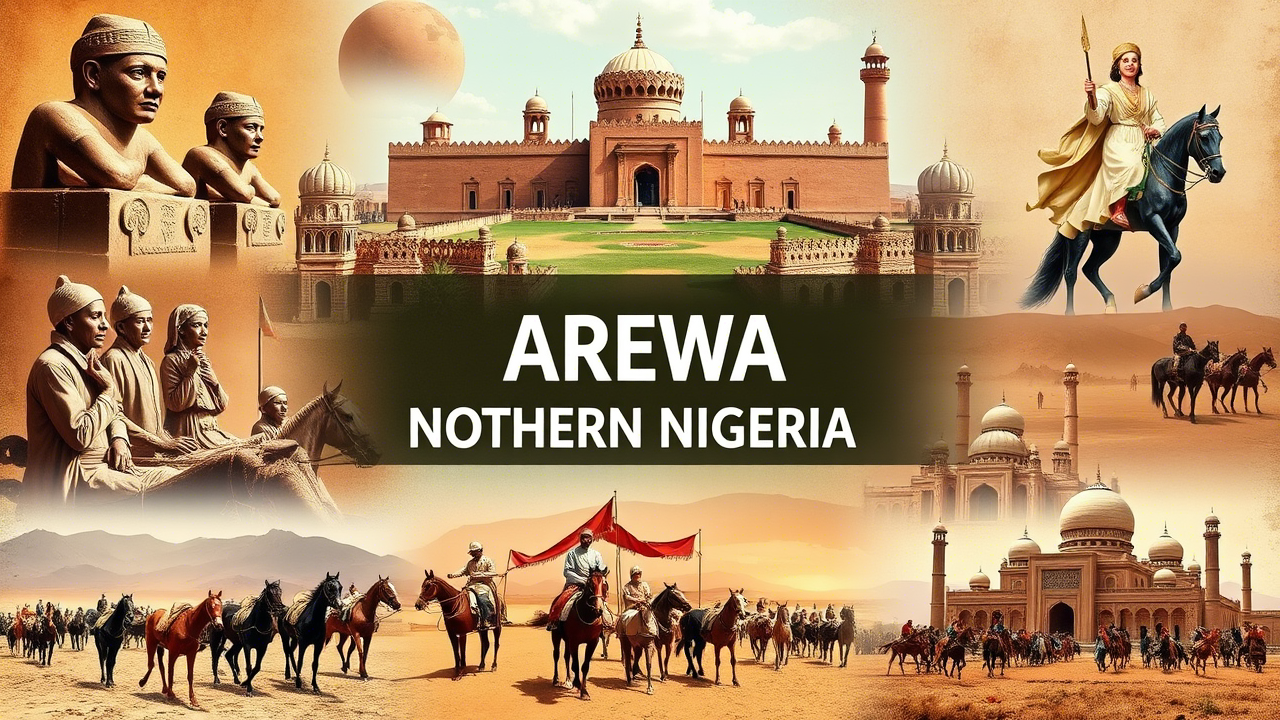Unveiling the History of Northern Nigeria: Key People, Places, and Moments That Shaped a Region
Northern Nigeria is a land of deep heritage, powerful kingdoms, and rich traditions that have shaped not only Nigeria but the entire West African subcontinent. From the iron-smelting Nok people to the Islamic revolutions of Usman dan Fodio, this region is a mosaic of history, identity, and influence.
Let’s explore the key people, places, and events that make up the remarkable history of Northern Nigeria.
🗿 The Nok Civilization: Cradle of Early Art and Innovation
Place: Central Nigeria (Kaduna Plateau)
Time: Around 1000 BC – 300 AD
Important Artifact: Nok Terracotta Sculptures
The Nok people were one of the earliest known civilizations in Sub-Saharan Africa. Famous for their lifelike terracotta statues, they were advanced in iron smelting, agriculture, and sculpture. Their influence laid the foundation for later societies in Northern Nigeria.
🏙 The Hausa City-States: Commerce, Culture, and Governance
Important Cities: Kano, Katsina, Zaria (Zazzau), Gobir, Daura, Biram, Rano
Time: 11th – 18th century
Key Figures: Queen Amina of Zazzau
The Hausa Kingdoms formed a network of independent city-states known for trade, crafts, and military strength. Kano became a hub for leatherwork and trans-Saharan trade, while Zaria, under Queen Amina, expanded its influence through warfare and diplomacy. Queen Amina, a legendary warrior queen, is still celebrated as a symbol of leadership and empowerment.
🕌 The Spread of Islam and the Rise of Islamic Scholarship
Influential Cities: Kano, Borno (Maiduguri), Sokoto, Katsina
Key Institutions: Madrasas, Islamic courts, Qur’anic schools
Notable Scholars: Sheikh Usman dan Fodio, Muhammad Bello, Nana Asma’u
Islam spread through trade routes and gradually transformed the region’s social and political structure. Sheikh Usman dan Fodio, a Fulani reformer, led a peaceful religious revolution that culminated in the Sokoto Caliphate—a vast Islamic empire based on justice, scholarship, and governance. His daughter, Nana Asma’u, was a pioneer of women’s education in Islamic West Africa.
⚔️ The Sokoto Caliphate: One of Africa’s Greatest Islamic Empires
Established: 1804
Capital: Sokoto
Founders: Usman dan Fodio, Muhammad Bello (his son), Abdullahi dan Fodio (his brother)
The Sokoto Caliphate unified much of Northern Nigeria under Islamic rule and became an intellectual and spiritual powerhouse. It introduced Sharia law, built schools, and fostered interregional unity among Hausa and Fulani communities. At its peak, it was one of the largest and most influential empires in Africa.
🐫 The Kanem-Bornu Empire: An Ancient Power Center
Capital: Ngazargamu, later Kukawa
Time: 9th century – 1893
Notable Ruler: Mai Idris Alooma
Centered near Lake Chad, the Kanem-Bornu Empire was one of Africa’s longest-lasting empires. Under rulers like Mai Idris Alooma, the empire strengthened Islamic institutions and military power. The Bornu dynasty established diplomatic links with the Middle East and North Africa.
🇬🇧 British Colonial Rule and the Amalgamation
Key Date: 1914 – Amalgamation of Northern and Southern Nigeria
Important Figure: Lord Frederick Lugard
System: Indirect Rule through Traditional Emirs
The British colonized Northern Nigeria in the early 1900s, using a system of indirect rule—a governance model that maintained the authority of emirs and traditional rulers. Though controversial, it preserved many aspects of Hausa-Fulani governance. The 1914 amalgamation of Nigeria created a single colony but laid the groundwork for political and cultural tensions that still influence Nigeria today.
🧭 Post-Independence Northern Nigeria: Leaders and Legacy
Notable Figures:
- Sir Ahmadu Bello – Premier of Northern Nigeria, Sardauna of Sokoto, and key figure in post-independence nation-building.
- Sir Abubakar Tafawa Balewa – Nigeria’s first Prime Minister and a respected Northern statesman.
- General Murtala Muhammed – A bold and reform-minded Nigerian military Head of State from Kano.
These leaders helped define Northern Nigeria’s political power and influence within the newly independent nation. Their policies and vision continue to shape regional politics, education, and identity.
🕌 Cultural Heritage That Lives On
Famous Markets: Kurmi Market (Kano), Monday Market (Maiduguri)
Cultural Events: Durbar Festival, Argungu Fishing Festival
Languages: Hausa, Fulfulde, Kanuri, Nupe
Northern Nigeria remains vibrant with culture and tradition. The Durbar festival, with its regal horse parades and traditional music, and the Argungu Fishing Festival, a celebration of river life and community, are living testaments to the region’s enduring heritage.
Final Thoughts: Honoring a Legacy of Leadership, Faith, and Culture
The history of Northern Nigeria is not just about the past—it’s about understanding how a region built on tradition, scholarship, and leadership continues to evolve. With iconic figures like Usman dan Fodio, Queen Amina, and Ahmadu Bello, and cities like Kano, Sokoto, and Maiduguri, Northern Nigeria is a wellspring of legacy that deserves recognition, preservation, and celebration.
